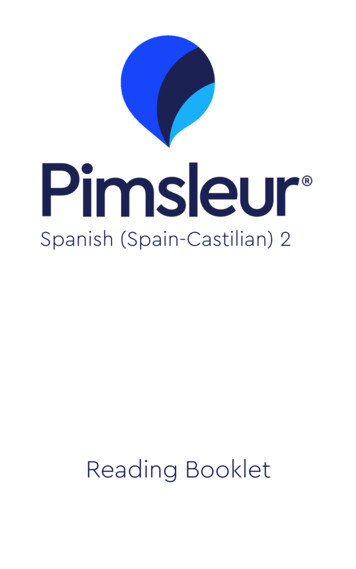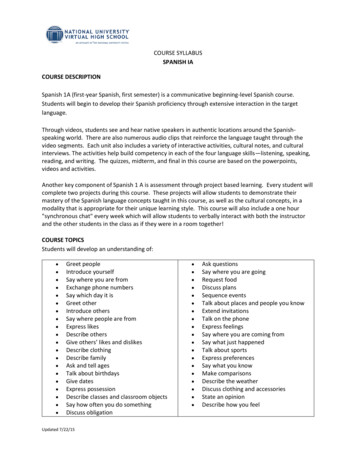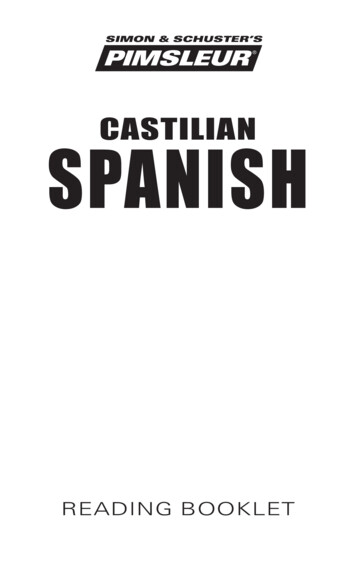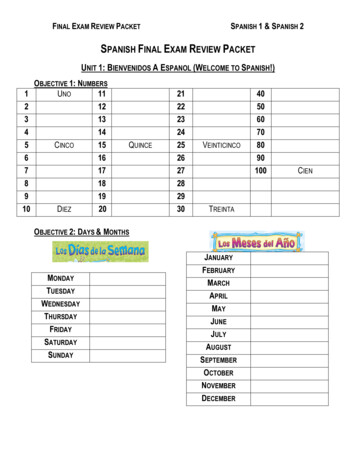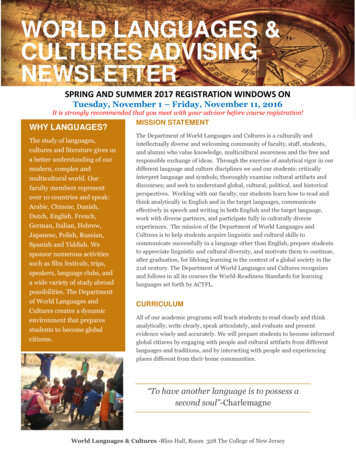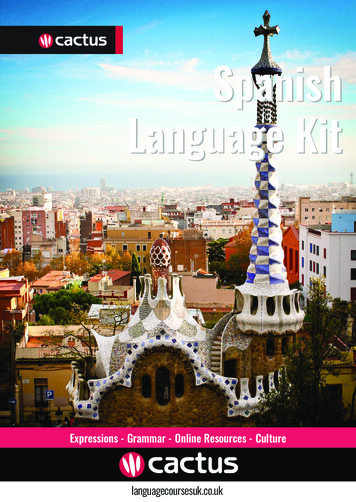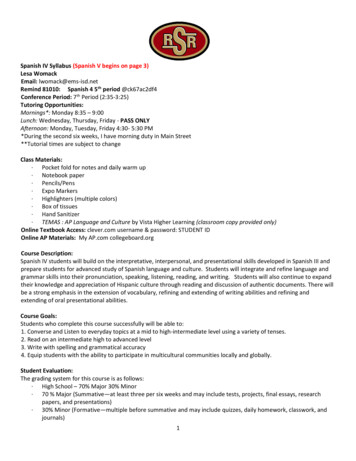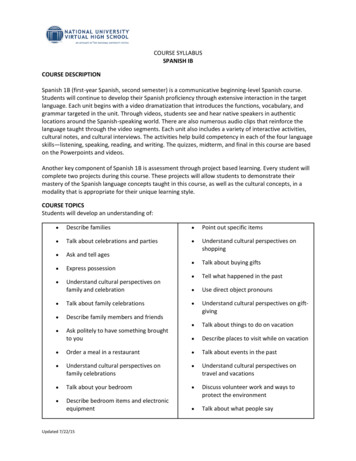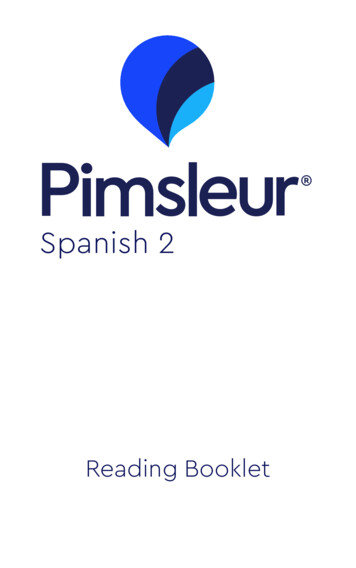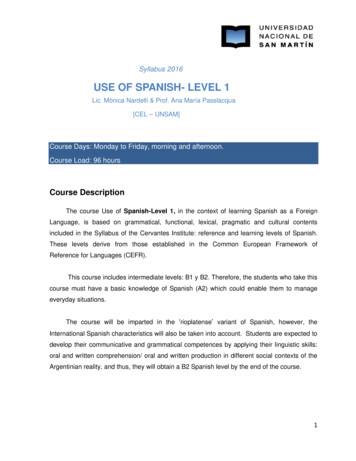
Transcription
Syllabus 2016USE OF SPANISH- LEVEL 1Lic. Mónica Nardelli & Prof. Ana María Passlacqua[CEL – UNSAM]Course Days: Monday to Friday, morning and afternoon.Course Load: 96 hours.Course DescriptionThe course Use of Spanish-Level 1, in the context of learning Spanish as a ForeignLanguage, is based on grammatical, functional, lexical, pragmatic and cultural contentsincluded in the Syllabus of the Cervantes Institute: reference and learning levels of Spanish.These levels derive from those established in the Common European Framework ofReference for Languages (CEFR).This course includes intermediate levels: B1 y B2. Therefore, the students who take thiscourse must have a basic knowledge of Spanish (A2) which could enable them to manageeveryday situations.The course will be imparted in the ‘rioplatense’ variant of Spanish, however, theInternational Spanish characteristics will also be taken into account. Students are expected todevelop their communicative and grammatical competences by applying their linguistic skills:oral and written comprehension/ oral and written production in different social contexts of theArgentinian reality, and thus, they will obtain a B2 Spanish level by the end of the course.1
ObjectivesThe general objective of this course is that students who are non-Spanish speakersand have achieved a basic level of usage, equivalent to an A2 level of the Common EuropeanFramework of Reference for Languages (CEFR), could acquire command of the SpanishLanguage, in its ‘rioplatense’ variant, at an advanced level of independent user, equivalent toaB2 level of CEFR.Therefore, students will need to achieve the following specific goals:a) To develop communicative competence in Spanish as a foreign language in differentsocial contexts.b) To strengthen the development of linguistic skills: interpretative and expressive abilities.c) To apply grammar structures to the appropriate learning level in different communicativesituations.d) To learn about Argentinian culture through communicative interactions and personalexperiences with native Spanish speakers.e) To be successful at applying the theoretical/practical knowledge of normative grammar todifferent communicative situations.f)To develop linguistic and non-linguistic resources which will enable the students tosuccessfully manage themselves in certain social interactions.COURSE BIBLIOGRAPHYThe course will work with authentic texts, audio-visual material from different areas andbooklets which are prepared by the Spanish as a Foreign Language teaching staff.Students must get one of the following Grammar books:Norwegian: Chiquito, Ana Beatriz, Spansk referansegrammatikk, Forlag: Fagbokforlaget,2009. ISBN: 9788245001266Swedish: Falk, Johan & Sjölin, Kerstin & Lerate, Luis, Modern spansk Grammatik, Förlag:Liber, 2010. ISBN: 97891470921542
Danish: Halvor Søeborg & Einar Krog-Meyer, Spansk Grammatik, Forlag: Schønberg,2010.ISBN: 9788757013191English: Butt, John & Benjamin, Carmen, A New Reference Grammar of Modern Spanish,Forlag: Hodder Education, 2011. ISBN13: 9781444137699DictionariesLarousse Staff: García-Pelayo,Ramón & Gross, Diccionario Larousse del españolmoderno,1983 . ISBN-978-0-451-16809-2Nicholas Rollin & Carol Styles Carvajal & Jane Horwood, Pocket Oxford Spanish DictionaryOxford University Press,2005.ISBN-13: 978-0198610724CONTENTS & COURSE CALENDARThis calendar could be subject to change. The teacher will announce in class any change ifnecessary. The students will use the grammar books and dictionaries mentioned above on adaily basis.WEEK 1: GRAMMAR CONTENTS: NOUN PHRASE. VERB PHRASE.AGREEMENT. PRESENTE SIMPLE DEL INDICATIVO (SIMPLE PRESENT OF THEINDICATIVE MOOD). REGULAR AND IRREGULAR VERBS: USESCOMMUNICATIVE CONTENTS: TO SPEAK ABOUT EVERYDAY ACTIONS USINGTHE SIMPLE TENSECULTURAL CONTENTS: HABITS AND COSTUMS FROM ARGENTINA AND FROMTHE STUDENTS’ RESPECTIVE COUNTRIESREADINGSFor the student: Texts and practice of Unit 1 of the Language and Cultural Topics Booklets.3
WEEK 2: GRAMMAR CONTENTS: VERBS ‘SER-ESTAR-HABER’ (TO BE-TOHAVE). PREPOSITIONS. PROGRESSIVE TENSE: TO BE GERUND. USES.COMMUNICATIVE CONTENTS:TO DESCRIBE PEOPLE, OBJECTS, ANDPLACES AND TO LOCATE THEM IN SPACE. TO EXPRESS EXISTENCE. TOEXPRESS ACTIONS THAT HAPPEN AT THE MOMENT OF SEAKING.CULTURAL CONTENTS: ARGENTINA AND ITS REGIONS. DESCRIPTION OF THEREGIONS OF THE STUDENTS’ RESPECTIVE COUNTRIES.READINGSFor the student: Texts and practice of Unit 2 of the Language and Cultural Topics Booklets.WEEK 3: GRAMMAR CONTENTS: SUBJECT-VERB INVERSION WITH VERBSSUCH AS: ‘GUSTAR’, ‘ENCANTAR’, ‘MOLESTAR’, ETC. (TO LIKE, TO BOTHER).PRONOMINAL VERBSCOMMUNICATIVE CONTENTS: TO EXPRESS YOURS AND OTHER PEOPLE’STASTES, PREFERENCES AND OPINIONS. TO ACCEPT AND TO DECLINEINVITATIONS. TO EXPRESS AGREEMENT OR DISAGREEMENT.CULTURAL CONTENTS: TANGO, MATE AND FOOTBALL IN ARGENTINECULTURE.READINGSFor the student: Texts and practice of Unit 3 of the Language and Cultural Topics Booklets.WEEK 4: GRAMMAR CONTENTS: DIRECT AND INDIRECT OBJECT PRONOUNS(DIFFERENCES WITH EUROPEAN SPANISH).‘FUTURO PERIFRÁSTICO’ AND ‘CONDICIONAL SIMPLE’ PERIPHRASTICFUTURE AND CONDITIONAL SIMPLE (USED TO EXPRESS COURTESY).COMMUNICATIVE CONTENTS: TO EXPRESS PURPOSE, NECESSITY,INTENTION AND OBLIGATION OR THEIR ABSENCE. TO REQUEST AND TOOFFER THINGS IN A CORTEOUS MANNER. TO TALK ABOUT FUTURUE PLANSAND PROJECTS.4
CULTURAL CONTENTS: SITUATIONAL DIALOGUES IN DIFFERENT SOCIALCONTEXTS.READINGSFor the student: Texts and practice of Unit 4 of the Language and Cultural Topics Booklets.WEEK 5: GRAMMAR CONTENTS: INDEFINITE PRONOUNS. ‘PRETÉRITOPERFECTO COMPUESTO’ (PRESENT PERFECT): EUROPEAN SPANISH USE.REGULAR AND IRREGULAR PAST PARTICIPLES.‘PRETÉRITO INDEFINIDO’ OR ‘PERFECTO SIMPLE’ (SIMPLE PAST OF THEINDICATIVE MOOD), REGULAR AND IRREGULAR VERBS. DIFFERENCES INTHE USE OF BOTH PAST TENSES.COMMUNICATIVE CONTENTS: TO TELL AND TO ASK ABOUT RECENT ACTSAND PERSONAL EXPERIENCES. TO PLACE, RELATE AND REFER TO PASTEVENTS.CULTURAL CONTENTS: POPULAR RELIGIOSITY IN LATIN AMERICAREADINGSFor the student: Texts and practice of Unit 5 of the Language and Cultural Topics Booklets.WEEK 6: GRAMMAR CONTENTS: ‘PRETÉRITO INDEFINIDO /PERFECTOSIMPLE’ (PAST SIMPLE), INDICATIVE MOOD. USES, REVIEW OF REGULAR ANDIRREGULAR VERBS.‘PRETÉRTITO PLUSCUAMPERFECTO’ (PAST PERFECT) OF THE INDICATIVEMOODCOMMUNICATIVE CONTENTS: TO TELL AND TO ASK ABOUT HISTORIC FACTSAND EVENTS. TO NARRATE A STORY AND TO ORGANIZE IT WITHIN ADISCOURSE FRAMEWORK. TO TELL ABOUT SOMEBODY’S LIFE.TO TELL ABOUT PAST EVENTS IN THE PAST.CULTURAL CONTENTS: LATINAMERICAN LEGENDS. IMPORTANT HISTORICALEVENTS OF LATIN AMERICAN HISTORY.5
READINGSFor the student: Texts and practice of Unit 6 of the Language and Cultural Topics Booklets.WEEK 7: GRAMMAR CONTENTS: ‘PRETÉRITO IMPERFECTO’ (PASTCONTINOUS FORM), INDICATIVE MOOD: REGULAR AND IRREGULAR VERBS.USES: DESCRIPTION OF OBJECTS, PEOPLE AND PLACES IN THE PAST,DESCRIPTION OF HABITS IN THE PASTCOMMUNICATIVE CONTENTS: TO TELL ABOUT COSTUMS IN THE PAST ANDTO DESCRIBE PEOPLE, PLACES AND OBJECTS IN THE PAST.CULTURAL CONTENTS: IMMIGRATION IN ARGENTINAREADINGSFor the student: Texts and practice of Unit 7 of the Language and Cultural Topics Booklets.WEEK 8: GRAMMAR CONTENTS: CONTRAST BETWEEN PRETÉRITOIMPERFECTO (PAST CONTINOUS) AND PERFECTO SIMPLE (SIMPLE PAST) OFTHE INDICATIVE MOODCOMMUNICATIVE CONTENTS: TO TELL ABOUT EVENTS, TALES AND STORIESIN THE PASTCULTURAL CONTENTS: ‘THE DISAPPEARED’ IN ARGENTINAREADINGSFor the student: Texts and practice of Unit 8 of the Language and Cultural Topics Booklets.6
WEEK 9: GRAMMAR CONTENTS: IMPERATIVE MOOD: AFFIRMATIVE ANDNEGATIVE. REGULAR AND IRREGULAR VERBS. USES.PRONOUN POSITION. THE STRUCTURE OF THE VERBS USED WITH THEPRONOUN ‘VOS’ (YOU)COMMUNICATIVE CONTENTS: TO GIVE ORDERS, INSTRUCTIONS,RECOMMEDATIONS AND ADVICE. INVITATIONS AND REQUESTS.CULTURAL CONTENTS: LATINAMERICAN MUSIC: LATIN RYTHMSREADINGSFor the student: Texts and practice of Unit 9 of the Language and Cultural Topics Booklets.WEEK 10: GRAMMAR CONTENTS: NON-PERSONAL FORMS OF THE VERB(INFINITIVE-GERUND-PAST PARTICIPLE). SENTENCE TYPES: INDEPENDENT,COORDINATE AND SUBORDINATE CLAUSES. ADVERBIAL PHRASE. PRESENTOF THE SUBJUNCTIVE MOOD: REGULAR AND IRREGULAR VERBS.COMMUNICATIVE CONTENTS: EXPLANATION OF OUR AND OTHERS’ CAUSESAND PURPOSES USING COMPLEX SENTENCE STRUCTURES.CULTURAL CONTENTS: CURRENT TOPICS OF INTEREST IN LATIN AMERICA.READINGSFor the student: Texts and practice of Unit 10 of the Language and Cultural Topics Booklets.WEEK 11: GRAMMAR CONTENTS: PRESENT TENSE OF THE SUBJUNCTIVEMOOD IN EXPRESSIONS OF INFLUENCE AND DOUBT AND WITH IMPERSONALAND PURPOSE CLAUSES.COMMUNICATIVE CONTENTS: TO EXPRESS WISH, REQUEST, SUGGESTION,RECOMMENDATION, DOUBT, POSSIBILITY, PURPOSE.CULTURAL CONTENTS: CARING FOR THE ENVIRONMENT.7
READINGSFor the student: Texts and practice of Unit 11 of the Language and Cultural Topics Booklets.WEEK 12: GRAMMAR CONTENTS: PRESENT OF THE SUBJUNCTIVE MOOD VS.PRESENT IN THE INDICATIVE MOOD TO EXPRESS OPINION. RELATIVEPRONOUNS, RELATIVE CLAUSES USING INDICATIVE AND SUBJUNCTIVEMOOD.COMMUNICATIVE CONTENTS: TO EXPRESS OPINIONS WITH COMPLEXSTRUCTURES.CULTURAL CONTENTS: CURRENT PUBLIC FIGURES IN THE LATINAMERICANSCENE.READINGSFor the student: Texts and practice of Unit 12 of the Language and Cultural Topics Booklets.WEEK 13:GENERAL REVIEW, DOUBT CLEARING SESSION.Evaluation & Grading PolicyA) Evaluation Criteria and requirements:Students must read all the required readings and complete the established assignments foreach class. The subject final grade will consist of a weighted average of an attitude grade(20%), which will include the student’s class participation throughout the course term andsubmission in due course and form of all the assignments given by the teacher, the finalwritten exam grade (40%) and the oral exam grade (40%).8
B) Attendance Policy:It will be required an 80% class attendance, the student who does not fulfill that attendancerequirement will automatically receive an “F”. In this class, 0.5 points will be deducted fromyour Attendance grade for every unexcused absence or if the student does not hand in thegiven assignments in due time and proper courseMissed Exams: “Make-up” exams are a privilege, one to be extended only to students whohave missed an exam with prior arrangement (one week notice) with the instructor or due toextenuating circumstances.Participation: We attach great importance to participation as a learning experience. Astudent s grade will suffer changes because of actions which might disrupt the groupexperience. For this reason all cell phones must be turned off before the class begins. Ifyou have a unique circumstance for which you must leave the phone on, consent from theinstructor is required beforehand. Students will have a significant point total deducted fromtheir class grade if they do not adhere to this regulation.C) Grading ScaleDescription10 (A) Excellent9 (A-) Very Good8 (B) Good7 (B-) Above Average6 (C)5 (C)4 (D)3 (F)2 (W)1 (I)AverageBelow AverageLowest Passing GradeFailureOfficially 76-7170-6564-6059-0Academic Advisor’s approvalAcademic Advisor’s approvalPlagiarism: An important objective of this course is to get students to learn how to writeessays. Students are expected to write their own assignments. Plagiarism not onlyundermines this learning process but also represents a serious breach of College policy and ofacademic honesty.Outside sources should always be referenced in the essay’s bibliography. Plagiarized work willreceive an automatic F. If you have any doubts on what constitutes plagiarism, do not hesitateto ask the Instructor.9
The course Use of Spanish-Level 1, in the context of learning Spanish as a Foreign Language, is based on grammatical, functional, lexical, pragmatic and cultural contents included in the Syllabus of the Cervantes Institute: reference and learning levels of Spanish. . The course will work with authentic texts, audio-visual material from .

